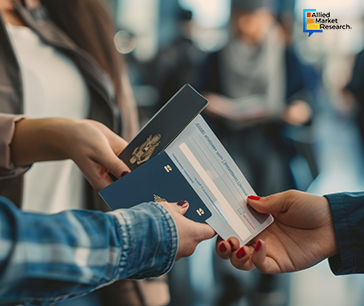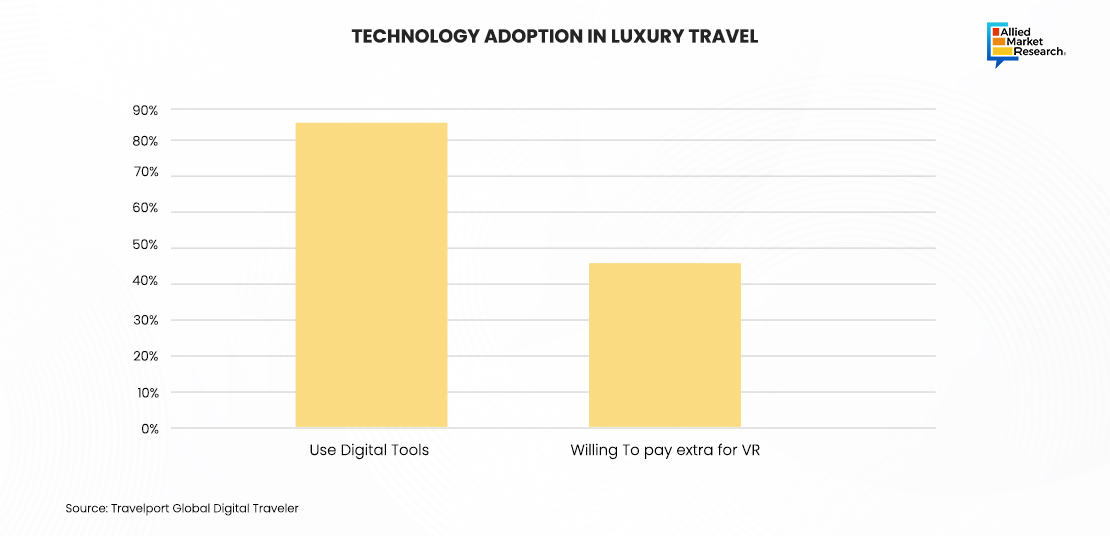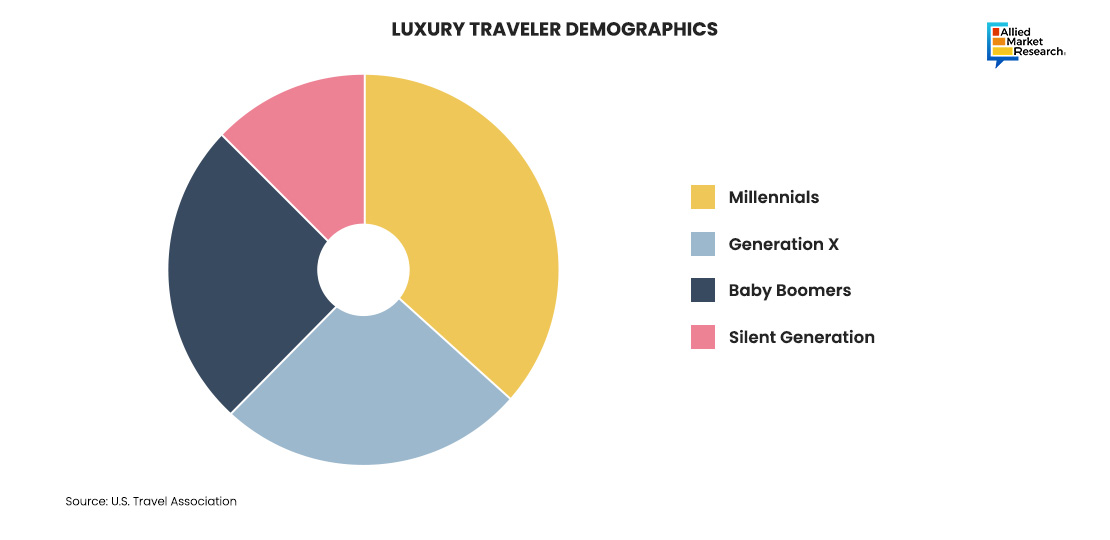Table Of Contents
- Channeling the Change in Traveling Post Pandemic
- A Technological Leap Transforming Travel: Passport to Digital Travel
- Social Media Turning to be the Pinnacle of Travel Idea?
- Sustainable Travel: The Next Boom
- Increasing Accessibility of Digital Concierges
- Transformative Technologies: AR and VR Revolutionizing Luxury Travel
- Technology Adoption in Luxury Travel
- Spend or save?
- Demographic Insights: Age Group Breakdown of U.S. Luxury Travelers
- France, Spain, and U.S. Lead the Way in Travel & Tourism
- To Sum Up

Roshan Deshmukh

Akshata Tiwarkhede
Luxury Travel—Living the Luxe Life

In recent decades, luxury travel has undergone a transformative journey with the introduction of sustainable travel, which attracts environmentally conscious travelers to eco-friendly resorts and responsible tourism initiatives. Rapid technological advancements, such as AI, VR, and digital concierge services have enhanced personalization and accessibility, while an increased focus on health and wellness boosts the appeal of luxury travel and biohacking holidays. In addition, infrastructural development and better accessibility to remote locations increase travel options, and the desire for safety and privacy in the post-pandemic world fuels the demand for private jets and secluded accommodations.
Channeling the Change in Traveling Post Pandemic
Recent studies have revealed that leisure travelling is being planned more often now as compared to the pre-pandemic period. According to consumer trend report of Deloitte, the COVID-19 pandemic ended a decade of continuous growth for travel & tourism, as the sector’s total contribution to global GDP fell by almost $4.9 trillion in 2020 while 62 million jobs were lost. In 2021, it provided some relief as the sector’s global economic contribution rebounded by 21.7% and it recovered 18.2 million jobs. Moreover, in 2022, the demand for international travel has returned into shape strongly as governments relaxed COVID-related travel restrictions. For instance, in 2022, the count of international overnight arrivals doubled, which was around 109% annual growth, as compared to 2021, reaching 62% of 2019 volumes.
Travel trends in 2023 reflected a significant emphasis on safety and hygiene, with travelers prioritizing destinations with robust health protocols. As per UNWTO data, international tourism receipts reached $1.4 trillion in 2023 according to preliminary estimates, about 93% of the $1.5 trillion earned by destinations in 2019.
According to the 2024 study of UNWTO World Tourism Barometer, 88% increase was recorded in international tourism in 2023 similar to that of the pre-pandemic levels, with an estimated 1.3 billion international arrivals . Desire to meet the pent-up demand of travelling since the outbreak of pandemic, increased air connectivity, and a strong recovery of global tourism destinations are expected to support full recovery of luxury travel services by the end of 2024. Thus, as the world gradually recovered from the COVID-19 pandemic, leisure travel experienced a massive resurgence with focus on safety and health-centric travel experiences.
A Technological Leap Transforming Travel: Passport to Digital Travel
Traditionally, the sale of tickets through offline counters involved long queues and manual processing. However, with advancements in technology this process has been revolutionized, making ticket purchasing more convenient and faster through online bookings, mobile ticketing, and automated kiosks. Rapid emergence of digital technologies, rise in adoption of smart devices, and increase in the number of internet users have promoted ticket booking from different online booking platforms such as Ticketmaster, StubHub, Book My Show, and SeatGeek. This is attributed to its multifold benefits such as elimination of the need to stand in long queues, ease of cancellation, improved customer management, and better deals. Thus, internet has made the process of booking tickets more convenient, efficient, and customizable for luxury travelers.

Moreover, AI is revolutionizing the way travelling is planned and experienced. AI-driven personalization and chatbots enhance customer engagement and satisfaction. Event organizers are utilizing AI algorithms to analyze data and predict traveler preferences, enabling targeted marketing campaigns and personalized recommendations for luxury travelers.
Social Media Turning to be the Pinnacle of Travel Idea?
The integration of social media in luxury travel is significantly transforming the landscape of the industry. According to the World Travel & Tourism Council (WTTC), the popularity of social media-influenced travel has majorly concentrated on younger travelers and leisure travelers. In which almost 40% of Gen Z travelers use social media platforms to plan their holidays, compared to just 29% for older generation. This generation is influenced by the posts of friends and family on social media platforms, which encourage them to venture out. Moreover, among younger travelers, social media platforms rank even higher than “information from friends and family” and “a random online search” as a source of decision-making. Almost 20% of Gen Z travelers follow a travel influencer, with higher proportions in India, Italy, and Hong Kong. Those over 45 years of age who still rely on traditional forms of travel reviews and word of mouth are less likely to use social media for travel inspiration. In addition, 70% of business travelers still prefer to seek written reviews when making their decisions.
Moreover, destination management organizations and travel marketing experts have recognized the importance of social media as a valuable source of travel information. Many of these organizations are increasingly investing in analytics to enhance the targeting and personalization of their advertisements. Concurrently, many luxury travelers are collaborating with social media influencers to expand their customer reach. As the cost of fast and reliable internet decreases, the number of social media users rises and new methods of virtual interaction develop.
Sustainable Travel: The Next Boom
To promote sustainable living, it is important for luxury travelers to prioritize sustainability as the most important part of their travel plan. This can be achieved by doing something as simple as booking an ecofriendly hotel or as intentional as volunteering with an immersive conservation project. Moreover, luxury travel brands should take conscious steps toward sustainable development and operation.
According to the WTTC's Environmental and Social Research, the travel & tourism sector was responsible for 8.1% of global greenhouse gas emissions in 2019. The industry is intensifying efforts to reduce its environmental impact. In October 2022, the International Civil Aviation Organization members committed to achieve a net-zero aviation sector by 2050, demonstrating a growing commitment to greener travel. The pandemic significantly accelerated this shift, as consumers experienced improved air quality during the economic slowdown and developed a stronger desire to reconnect with nature. However, lack of travel highlighted its significance, keeping the demand for travel high. Consequently, sustainable travel, which addresses both environmental concerns and travel demand, has gained high traction in the recent years.

For travel providers, this shift presents an opportunity to decouple growth from emissions and further decrease their emission intensity, which has been declining at an average rate of 2.3% per year since 2010. A Trip.com survey revealed a strong commitment among travelers to reduce their carbon footprint. Over 59% were engaged in some form of sustainable travel recently, 69% actively (always or occasionally) seek sustainable travel options, and 75% expressed a desire to choose sustainable travel options in the future. In addition, more than 59% were either already paying to offset their carbon emissions or were willing to consider such options if the price was right.
Increasing Accessibility of Digital Concierges
Personal digital concierge has emerged as a solution that caters to the needs of travelers who are seeking finest experience without having to handle the planning and arrangements themselves. Moreover, accessibility to personal digital concierge systems and services has become easier due to global platforms that allow travelers to connect with local residents for concierge assistance without having to pay hefty membership fees. This shift is expected to make personalized digital concierge services more widely available to a broader audience. In addition, some digital concierge services offer pre-customized experiences that can be easily purchased, allowing travelers to build their custom itineraries.
Transformative Technologies: AR and VR Revolutionizing Luxury Travel
Augmented reality (AR) and virtual reality (VR) are transforming the luxury travel sector by providing immersive and enhanced experiences. These technologies allow travelers to explore destinations, accommodations, and activities in ways that were previously unimaginable, adding value to the pre-travel and on-trip phases.
The adoption rate of AR and VR technologies in the travel industry has been accelerating, with a 30% increase in integration into travel services from 2019 to 2022. Moreover, hotels and resorts implementing AR/VR have reported a 20% increase in bookings and a 15% increase in customer satisfaction . In addition, millennials and Gen Z travelers, who are more tech-savvy, are the primary drivers of AR/VR adoption in luxury travel. 70% of these demographics have expressed a preference for tech-enhanced travel experiences.
Technology Adoption in Luxury Travel
The luxury travel sector is undergoing a significant transformation with the adoption of advanced technologies, such as digital concierge services, AI-driven personalization, and blockchain for secure transactions. According to a report by PwC—a global professional services network—VR experiences can increase booking conversion rates by 13%. However, this increased digital integration brings heightened risks of cyber-attacks, similar to those observed in heavily targeted industries such as financial services, healthcare, and IT/telecommunications. Financial services have experienced the highest number of cyber-attacks, accounting for nearly 23% of all attacks in 2021 and 2022, while healthcare faced significant ransomware threats in 2020 and 2021 due to the sensitivity of patient data.
Moreover, the IT and telecom sectors witnessed a surge in attacks with rise in trend of remote work. The luxury travel industry, experiencing a 60% increase in cybersecurity incidents in 2022 are inclined toward prioritizing robust cybersecurity measures. This includes investing in AI-driven security systems, continuous monitoring, regular employee training, and partnerships with specialized cybersecurity firms. According to Cybersecurity Ventures forecasts, the global cybercrime costs projected to reach $10.5 trillion annually by 2025. This has forced luxury travel companies to proactively address these challenges to protect client data, maintain their reputation, and continue offering exceptional experiences in a digital world.
Spend or save?
From a consumer viewpoint, the choice between saving or spending in the luxury travel sector is driven by a desire for unique and memorable experiences, a focus on health and wellness, and the attraction of technological advancements that offer convenience and personalization. Luxury travel is often viewed as a status symbol and a source of personal satisfaction, with social media sharing enhancing its appeal. Eco-conscious travelers are willing to pay extra for sustainable and ethical travel options, considering these expenses as investments in environmental conservation.
Furthermore, while inflation presents challenges for the luxury travel industry by raising costs and affecting consumer spending power, the sector's strength lies in its wealthy customer base, who are less affected by price fluctuations. In July 2022, about 60% of travelers indicated that inflation would influence their travel plans for the autumn. Affordability is particularly crucial for Gen Z travelers who prioritize value deals and discounts as the most valuable travel resources. When planning trips, they tend to place much greater importance on affordability than on other factors such as personalized recommendations.

Demographic Insights: Age Group Breakdown of U.S. Luxury Travelers
According to data from the U.S. Travel Association, millennials make up 32%, generation X accounts for 29%, baby boomers comprise 28%, and the silent generation represents 11% of the total luxury travelers in the U.S. This distribution highlights the significant presence of younger travelers in the segment, alongside a substantial representation from older generations.
France, Spain, and U.S. Lead the Way in Travel & Tourism
According to the United Nations World Tourism Organization (UNWTO), France leads as the most visited country globally, attracting 89.4 million visitors annually. Following closely is Spain, with 82.8 million visitors, and the U.S., welcoming 79.6 million visitors each year. This data underscores the enduring appeal of these destinations, highlighting France's cultural richness, Spain's vibrant landscapes and traditions, and the diverse attractions of the U.S. These countries remain top choices for travelers seeking a mix of historical, cultural, and modern experiences.
To Sum Up
The luxury travel industry is evolving dynamically, driven by trends such as personalized and experiential travel, wellness tourism, technological advancements, and the increasing demand for privacy and exclusivity. Affluent travelers prioritize unique, immersive experiences and are willing to invest in high-quality, health-focused retreats. In addition, the industry's shift toward sustainable and eco-friendly practices reflects a growing consumer preference for responsible travel options. By adopting sustainable initiatives, luxury travel providers can cater to environmentally conscious travelers, ensuring that luxury travel remains attractive and relevant. Despite inflationary pressures, the industry's focus on innovation, personalization, and sustainability positions it well to continue thriving and meeting the sophisticated demands of its clientele.

For further insights, get in touch with AMR analysts.

